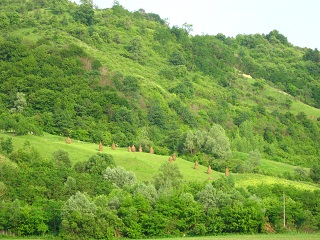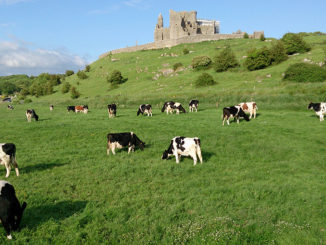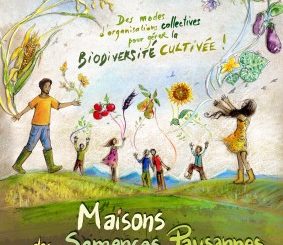This is the first of a four part series of posts from the FAO’s Regional Conference for Europe in Romania. For all posts, see here.
This week, the Food and Agriculture Organization (FAO) of the United Nations will hold its annual Regional Conference for Europe in Romania. The central topic revolves around why food loss and waste occur, what can be done to limit these problems and how this relates to small farmers in Europe and Central Asia. The event will provide an important opportunity for Romanian peasants to directly express their personal views on the present situation and future of family farming.

The UN has designated 2014 as the “International Year of Family Farming” (IYFF). There is a direct link between this theme and the host organization of this year’s conference. Eco Ruralis is a Romanian NGO which includes in its membership a lot of family farmers who are mostly peasants. Other members include small organic farmers, urban and rural gardeners as well as agricultural activists. This diverse group of people serves as a strong unified voice that advocates for non-industrial, small-scale organic agriculture. Many CSOs including Eco Ruralis feel that food sovereignty should be the goal of agriculture. In this view, a person who has control over land rights and the material resources to grow food should be able to develop their own food security and not rely on a government to provide for them.
NGOs that focus on agricultural issues have many desires and demands for the FAO conference. First and foremost, they want to express the importance of small-scale organic agriculture and how the vast majority of people that practice this are actually family farmers. They advocate short chain food distribution where local markets are valued more than super markets. The real producers of our healthy, organic food directly or indirectly sell their products at local markets. Often, a family member or relative serves this duty. Long chain food distribution doesn’t work for many reasons. One example is food freshness. Food is simply not as fresh due to medium and long range transportation. It sometimes goes through several facilities before being packaged and sent to a retail store. The less fresh agricultural products are, the less nutritional value they contain once bought and finally consumed. Most of the time, the food sold by these retailers has been cultivated with unhealthy additives such as non-organic pesticides and herbicides. And let’s not even get started about whether or not the food item or animal feed used to produce it was genetically-modified. The issues above definitely affect the health of the consumer in a negative way. Regional, national and international super market retailers have no real connection to growing food. They just sell the food that others work hard to produce and pocket the money. Why should these entities benefit on the backs of tireless farmers? The answer is, they shouldn’t.
The International Assessment of Agricultural Knowledge, Science and Technology for Development (IAASTD), submitted in 2008, is a very influential report that supports what Civil Society has been advocating for a long time: a “bottom-up” approach to agriculture. The IAASTD was conducted as an inter-governmental process which consulted 900 participants from 110 countries. FAO, the World Bank, the World Health Organization (WHO) and several others co-sponsored the making of this three year report. The document contains a Global Assessment, five Sub-Global Assessments and a Synthesis Report. Basically, it points to small-scale family farming and polyculture as the keys to establishing food sovereignty on a long term basis and eliminating world hunger.
Other notable conclusions include: GMO crop cultivation and loss of agricultural land through land grabbing or other means (also concerning land tenure rights) are issues that negatively affect agriculture across the globe. The IAASTD provides recommendations and lists priorities that will benefit those most vulnerable to food insecurity. It includes specific sections on the future of traditional farming and how small farmers are negatively impacted by global trade. The whole report is a voluntary guideline for how governments should make changes in order to better meet the food needs of every person in their country and the world.
The International Peasant Movement, La Via Campesina (VC), submitted its own “Declaration on the Rights of Peasants – Women and Men” in 2002. This document accurately describes the violation of peasants’ rights in the form of unfair free trade agreements and government subsidies that only benefit large-scale industrial farmers. It also mentions that the usage of hybrid and GM crops threatens peasants’ crops and the health and safety of consumers. It signals that access to land issues have arisen and many peasants have lost their agricultural lands due to the opening of global land markets. VC says that the “Charter of the Peasant,” a UN document created in 1978, did nothing to stop international liberalization policies which negatively affected peasants. They say that peasants need an International Convention on the Rights of Peasants (ICRP). In 2010, the UN Human Rights Council Advisory Committee submitted a “Preliminary study on discrimination in the context of the right to food.” This report includes VC’s peasants’ rights declaration and called upon its Human Rights Council members to consider the development of an ICRP. In 2013, the UN conducted its first session of the open-ended intergovernmental working group on a United Nations declaration on the rights of peasants and other people working in rural areas. We are still waiting on future actions that may be taken to address peasant issues in this decision-making body. Eco Ruralis, a member of the European Coordination Via Campesina (ECVC), fully supports their peasants’ rights declaration and the need to form an ICRP. Peasants’ struggles are very similar to the struggles of indigenous peoples around the world. If a UN Declaration on the Rights of Indigenous Peoples exists, then it would only be fair and equal to have a UN Declaration on the Rights of Peasants.
InfOMG, the Romanian GMO Info Center, strongly rejects the European Commission’s potential approval of the cultivation of the new genetically-modified Pioneer 1507 corn variety in the EU. For many reasons I’ve mentioned in an earlier article, the Trans-Atlantic Trade and Investment Partnership (TTIP) between the EU and the US must be stopped. Any proposal for a plant reproductive material law like the one drafted by the EU Commission should be soundly defeated just like the latest draft seed regulation was by MEP’s.
The phenomenon of land grabbing is destabilizing to the whole world because it is restricting access to land for many local residents who want to either continue or begin small-scale farming. Land grabbing usually gives way to big industrial projects that cause harmful effects on local communities and the environment. Currently, Romania is also going through a resource rush, capitalizing on forests, gas and rare minerals like gold, without addressing also the socio-environmental implications, which only deepens the land grabbing concerns. We need a return to strong land tenure rights and create laws that protect enormous pieces of land from being owned by any person, corporation or government regardless of place of origin.
Eco Ruralis will push for all of the above steps to help peasants and other small farmers at the FAO conference.
In essence, the IAASTD (co-sponsored by FAO) describes how peasants and other small-scale family farmers are the solution to global food issues and crises, not the problem. They are the example that the rest of the world needs to emulate. The FAO Regional Conference for Europe needs to be the event where these farmers start receiving lots of positive recognition for their invaluable contribution to agriculture. Their questions, comments and concerns need to be listened to carefully. Eastern European and Central Asian peasants combine to number in the tens of millions. They are connected through similar pasts regarding forced farming collectivization and industrialization under former communist states. The whole world is being industrialized yet peasants and other family farmers living in these vast geographical regions continue serving as the primary examples of how to practice environmentally-conscious subsistence agriculture without producing food waste. And that’s the way it should be.
An overview of conference the schedule:
Who: Over 60 participants from 29 different countries in Europe and Central Asia
Where: Bucharest, Romania (Palace of Parliament)
When: March 29-30, Non-Governmental Organizations (NGO) / Civil Society Organizations’ (CSO) Consultation Meeting
March 31, Committee on World Food Security (CFS) Multi-Stakeholder Dialogue
April 1-2, European Commission on Agriculture (ECA) – Session and Debate
April 1-4, Regional Conference for Europe (ERC) including Ministerial Round Table
A number of Side Events including a Food Producer Fair will be held April 1-3.
Recent posts by Attila Szocs




